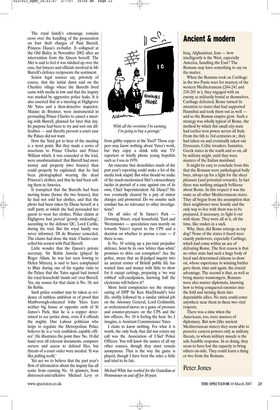Ancient & modern
Iraq, Afghanistan, Iran — how intelligently is the West, especially America, handling the East? The Romans may have something to say on the matter.
When the Romans took on Carthage in the two Punic wars for mastery of the western Mediterranean (264-241 and 218-201 BC), they engaged with an enemy as militarily brutal as themselves. Carthage defeated, Rome turned its attention to states that had supported Hannibal and took them out as well and so the Roman empire grew. Such a strategy was wholly typical of Rome, the method by which this small city-state had earlier won power across all Italy. From the 6th to 3rd centuries BC, they had taken on and eventually taken out Etruscans, Celtic invaders, Samnites, Greek states in the south and so on, all by military might, until they were masters of the Italian mainland.
It might be easy to conclude from this that the Romans were pathological bully boys, always up for a fight for the sheer pleasure (and potential rewards). In fact there was nothing uniquely bellicose about Rome. In this respect it was the same as all other Mediterranean states. They all began from the assumption that their neighbours were hostile and the only way to live with them was to be prepared, if necessary, to fight it out with them. They were all at it, all the time, like snakes in a sack.
Why, then, did Rome emerge as top dog? None of the states it faced were exactly pushovers, especially Carthage, which had come within an ace of defeating Rome. The first reason is that no other state had such a huge body of loyal and determined citizens to draw on, whose experience in winning battles gave them, time and again, the crucial advantage. The second is that, as well as being master warmongers, Romans were also master diplomats, knowing how to bring conquered enemies into the fold and turning them into dependable allies. No state could come anywhere near them in these two vital respects.
There was a time when the Americans, too, were masters of diplomacy. But now (like ancient Mediterranean states) they seem able to perceive eastern powers only as military threats, to whom military muscle is the sole feasible response. In so doing, they seem to have lost the capacity to bring others on-side. They could learn a thing or two from the Romans.
Peter Jones


























































































 Previous page
Previous page